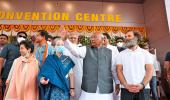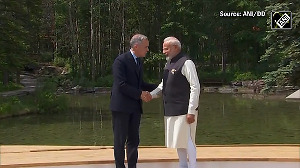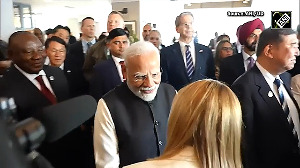'...despite not being ideologically aligned with a vast section of the people of the north east.'
'But the results in Tripura, Nagaland and Meghalaya show that no party, including the BJP, can say that it has really done well.'

"Voting in the north eastern states is not ideological; it is purely strategic and therefore transitional, and ephemeral. Today it is something and tomorrow it may just shift. It does not actually reflect the ideological depth of a party," says Dr Rajesh Dev, Associate Professor of Politics at Delhi University and former guest faculty at the Northeast Hill University in Shillong.
Dr Dev was a lecturer for two decades at the Government Women's college, Shillong. His focus is on politics of ethnic identity and indigeneity, especially in north east India.
"The BJP is a nationally dominant party today, but tomorrow, if any other party becomes dominant, there will be a significant change in the voting behaviour in the states of the north east," Dr Dev tells Rediff.com's Archana Masih in a phone conversation.
What is the message that has come out of the results of the three north eastern states?
Firstly, and significantly, the north east cannot be looked as a collective whole because the politics and culture of Tripura is very different from the politics and culture of Meghalaya and Nagaland and other states.
For example, Christianity is not as dominant in Tripura as it is in Nagaland or say in Mizoram.
Therefore, there are different micro-level discourses in each state.
We need to de-segregate the idea of the north east as a whole and see the individual cultures and politics of each state separately.
There are many differences and complexities in every state.
The result shows that no party, including the BJP, can say that it has really done well.
The BJP has made good progress in a region where the party did not have a presence a decade ago and has become a main player in Assam and Tripura particularly.
If we take the 'north east' as a category, then the BJP should be pleased because it has done well despite not being ideologically aligned with a vast section of the people of the north east.
The general narrative is that despite its ideology, the people of the north east have accepted the BJP.
But it also glosses the fact that the BJP has lost seats and vote share in Tripura and maintained seats in Nagaland and Meghalaya. So, we need to make this distinction.
There is a larger symbolic factor, but there are also substantive issues which need deeper introspection.
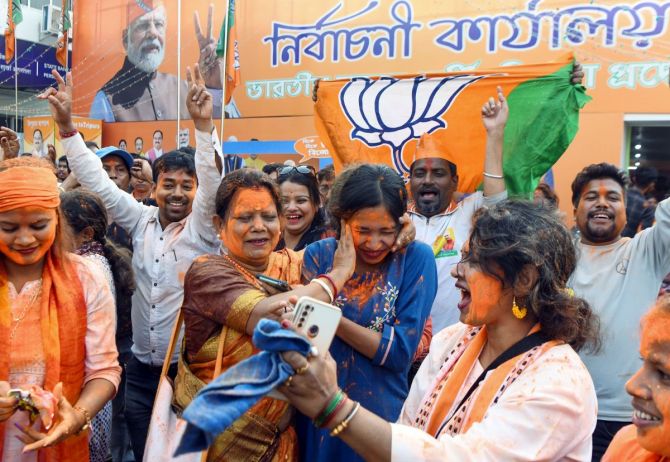
What do you think plays in the mind of the voters in the Dorth east when they cast their vote?
Voting in the North eastern states is not ideological; it is strategic and therefore very transitional, and even ephemeral.
Today it is something and tomorrow it may just shift.
Meanwhile, voting in many states of mainland India is on an ideological basis, especially in the north, where the BJP is very dominant.
Hence issues like beef, love jihad, Ram Janmabhoomi, Article 370 have appeal to the voters in the north who are aligned to the BJP's ideology.
So definitely, this is purely strategic voting, it does not actually reflect the ideological depth of a party.
The BJP is a nationally dominant party today, but tomorrow, if any other party becomes dominant, there will be a significant change in the voting behaviour in the states of the North east.
Tomorrow, it may just shift.
Why does that happen?
It happens primarily because of the elites. It may be politically incorrect, but the ability of a national party to incorporate the needs of indigenous communities is much more assured, and faster if they incorporate the elites.
The elites have a relationship with the communities that they represent which makes it possible for them to actually take people along.
These are some of the things that need to be looked at a micro level.
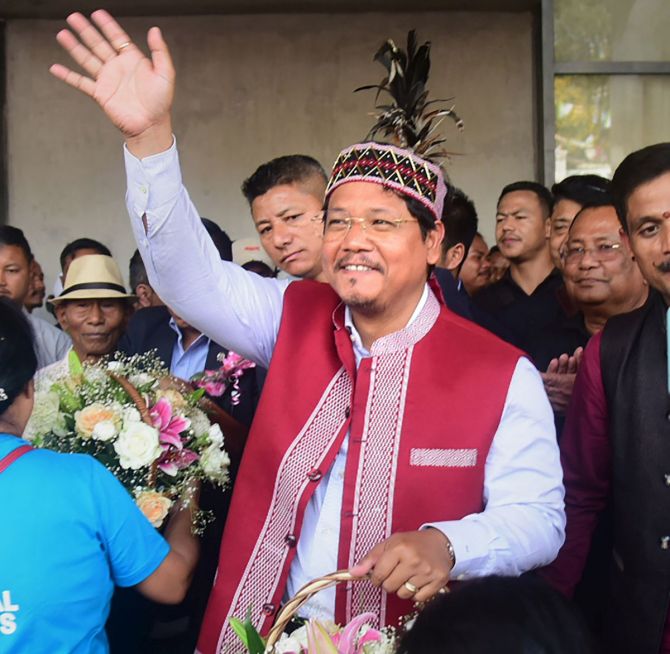
Apart from Assam and Tripura where it has won two back-to-back elections, the BJP is a junior partner in Nagaland and Mizoram. Is it progressing to becoming the main player in the region or is that a premature assumption?
The BJP has piggybacked on regional or smaller parties wherever the party is not dominant -- for example, Maharashtra -- and then come to dominate those parties.
In Meghalaya, for instance, they will piggyback on the NPP (National People's Party), but they may not be able to consume the NPP.
If you go back and look at the history of the Congress in Meghalaya, you will find that in the initial years when the party was establishing itself, it was actually more vocal about indigenous rights, land, etc.
But once the Congress became dominant, it shifted to national issues and regional parties were talking about cadastral survey etc and moved into indigenous issues that the Congress initially espoused.
These are some of the micro issues and elections are the pivot for understanding the culture and democracy in our states.
If we move beyond that we will find that there are much more interesting micro issues -- and connecting the dots might give us a better explanation.
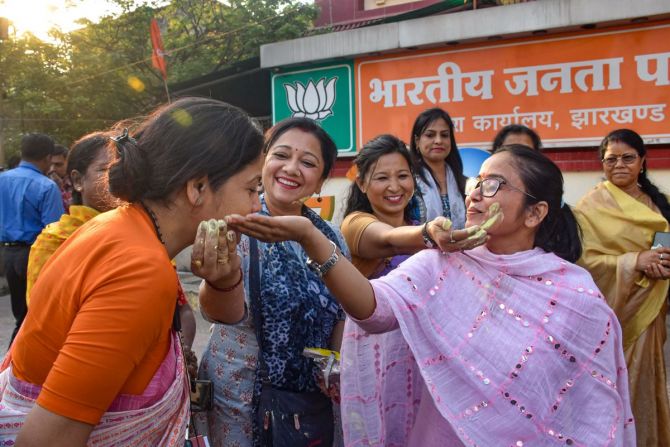
You mentioned the erstwhile dominance of the Congress in Meghalaya. What do you see as the future of the Congress in the north east?
The Congress is suffering from a perception failure.
Despite the Bharat Jodo Yatra and despite its intentions, there is a very strong perception among people that it's a party which cannot deliver at this moment.
People think that whatever changes have been made in the leadership are very nominal and are just window dressing.
My personal view that people don't have a problem with the (Gandhi-Nehru) family, but they have a problem about the Congress as a whole.
In order to revive itself, in the north east, and in other parts of India, the Congress needs to completely overhaul itself.
Why did Mukul Sangma, who has been with the Congress, suddenly decide to go with TMC when he knew it was a political gambit?
The fact that the TMC got five seats is actually good because the TMC had no organisation and started from scratch.
The Congress needs to introspect especially in Tripura and Meghalaya about its organisation, leadership and how they can change the perception that the people have come to hold.
It's a long haul. It's not just the state elections, but will continue in 2024. The Congress is not in a position to fight back because of its perception among the people. This perception has become very institutionalised.
The people have almost come to give up on the party. The Congress basically has lost its way.
If it wants to recover, then it needs to perhaps change the very framework of their understanding about what is going wrong.



